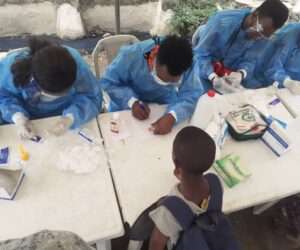The Nigeria Centre for Disease Control and Prevention (NCDC) has clarified that there are currently no cases of Ebola virus disease in the country.
The agency, in a public health advisory issued on Saturday and signed by its Director-General, Jide Idris, stated that it is working with relevant ministries, departments, agencies, and partners to monitor disease occurrences and enhance Nigeria’s preparedness.
According to the NCDC, ongoing measures include heightened surveillance at the nation’s borders and points of entry to ensure early detection of potential cases.
It noted that “infection prevention and control practices are also being reinforced in healthcare facilities nationwide to safeguard both patients and healthcare workers.”
“There are no cases of Ebola virus disease in Nigeria, as of now. However, the NCDC, in collaboration with relevant ministries, departments, agencies and partners, continues to monitor disease occurrence and initiate measures to strengthen our preparedness in the country,” the agency said.
It added that its risk communication, and community engagement structures have been activated to provide timely and accurate information to Nigerians, while also tracking and addressing rumours, perceptions and misinformation.
Ebola outbreak in DR Congo
The latest Ebola outbreak in the Democratic Republic of the Congo (DRC) has claimed 16 lives, including four health workers, from 28 suspected cases in Kasai Province.
Laboratory tests conducted on 3 September at the National Institute of Biomedical Research in Kinshasa confirmed Ebola Zaire as the cause.
The outbreak comes as Central and West Africa grapple with overlapping health and humanitarian crises, including cholera, malnutrition, and displacement.
The DRC has experienced 15 Ebola outbreaks since the disease was first identified in 1976. Its last outbreak in 2022 was brought under control within three months. Kasai Province previously recorded outbreaks in 2007 and 2008.
Preventive measures
In its advisory, the NCDC noted that vaccines and therapeutics are available for some strains of Ebola.
However, it stated that early recognition, isolation of patients, and initiation of supportive treatment reduce morbidity and the likelihood of death.
It urged Nigerians to maintain strict hygiene, avoid physical contact with anyone showing symptoms of unknown illness, and refrain from handling or consuming bush meat such as fruit bats, monkeys and apes.
To reduce the risk of transmission from animals to humans, it said animals should be handled only with gloves and protective clothing, while animal products must be thoroughly cooked before consumption.
The centre also warned against direct contact with the blood, saliva, vomit, urine, or other bodily fluids of suspected or confirmed Ebola patients.
It advised anyone who develops symptoms after travelling to or from affected countries to immediately call the NCDC toll-free line (6232) or their State Ministry of Health hotline for guidance, and to remain in place until responders arrive.
Guidance for health workers and travellers
The NCDC stressed that healthcare workers must strictly observe infection prevention and control measures, including the use of personal protective equipment.
It also issued travel advice, urging Nigerians to avoid all but essential travel to countries with confirmed Ebola cases.
READ ALSO: NCDC warns AMR might claim 39 million lives by 2050
Those who have returned or transited through affected countries within the last 21 days were advised to watch for symptoms such as fever, sore throat, diarrhoea, vomiting, weakness or unexplained bleeding.
“On our part, we will continue to strengthen surveillance across the country, including our borders and airports, especially for travellers from affected areas; alerting our health workers to heighten their level of suspicion for suspected cases; enhancing our laboratory capacities for quick testing of suspected cases; as well as coordination with the World Health Organisation and African regional health authorities to monitor developments and share critical information,” the agency said.
The NCDC also noted that Nigeria continues to manage other outbreaks, including Lassa fever, meningitis, diphtheria, mpox, measles and anthrax.











